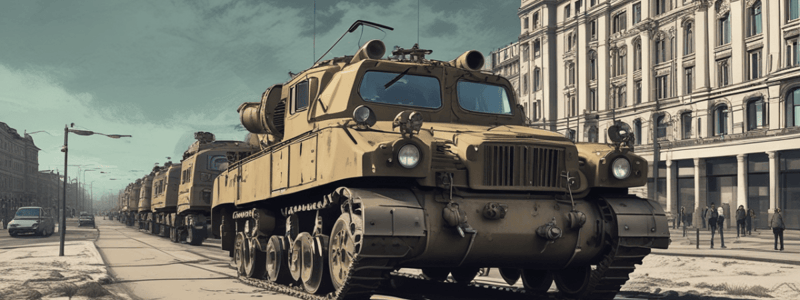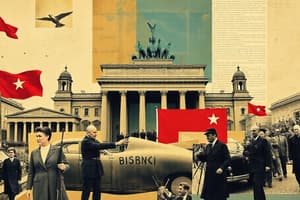Podcast
Questions and Answers
What was a possible reason for the lack of direct action during the 1958 crisis?
What was a possible reason for the lack of direct action during the 1958 crisis?
- A lack of interest in the Berlin issue
- A cautious approach to avoid triggering a military confrontation (correct)
- A focus on other international crises
- A desire to provoke a military confrontation
What was the outcome of the 1958 crisis in terms of the Berlin issue?
What was the outcome of the 1958 crisis in terms of the Berlin issue?
- A persistence of the stalemate (correct)
- A escalation of the conflict into a broader war
- A resolution to the underlying tensions regarding Berlin
- A shift of focus to other international crises
What did the 1958 crisis reinforce about Berlin?
What did the 1958 crisis reinforce about Berlin?
- Its insignificance in the Cold War
- Its strategic military importance
- Its symbolic importance in the Cold War (correct)
- Its economic importance
What did the crisis demonstrate about the Cold War?
What did the crisis demonstrate about the Cold War?
What was the outcome of the Berlin Crisis of 1961?
What was the outcome of the Berlin Crisis of 1961?
What did the 1958 crisis contribute to?
What did the 1958 crisis contribute to?
What was the main objective of Nikita Khrushchev's ultimatum in 1958?
What was the main objective of Nikita Khrushchev's ultimatum in 1958?
What was the significance of Berlin in the Cold War dynamics between the East and the West?
What was the significance of Berlin in the Cold War dynamics between the East and the West?
What was the Western response to Khrushchev's ultimatum in 1958?
What was the Western response to Khrushchev's ultimatum in 1958?
What was the result of Khrushchev's ultimatum in 1958?
What was the result of Khrushchev's ultimatum in 1958?
What was the broader significance of Berlin in the Cold War dynamics?
What was the broader significance of Berlin in the Cold War dynamics?
What was the main reason behind Khrushchev's demand to make West Berlin a 'free, demilitarized city'?
What was the main reason behind Khrushchev's demand to make West Berlin a 'free, demilitarized city'?
What was the context of the Khrushchev Thaw?
What was the context of the Khrushchev Thaw?
Who rose to power following Stalin's death in 1953?
Who rose to power following Stalin's death in 1953?
What was the primary reason for the ongoing tensions between the Soviet Union and the Western Allies regarding Berlin?
What was the primary reason for the ongoing tensions between the Soviet Union and the Western Allies regarding Berlin?
How did the 1958 crisis impact the underlying tensions regarding Berlin?
How did the 1958 crisis impact the underlying tensions regarding Berlin?
What was the outcome of the Berlin Crisis of 1961?
What was the outcome of the Berlin Crisis of 1961?
What was the significance of Berlin in the context of the Cold War?
What was the significance of Berlin in the context of the Cold War?
What was the broader significance of the 1958 crisis?
What was the broader significance of the 1958 crisis?
What was the consequence of the ongoing Cold War struggles in Berlin?
What was the consequence of the ongoing Cold War struggles in Berlin?
What was the primary goal of Nikita Khrushchev's ultimatum to the Western powers in 1958?
What was the primary goal of Nikita Khrushchev's ultimatum to the Western powers in 1958?
What was the symbolic significance of West Berlin in the Cold War dynamics?
What was the symbolic significance of West Berlin in the Cold War dynamics?
What was the primary reason behind Khrushchev's demand to make West Berlin a 'free, demilitarized city'?
What was the primary reason behind Khrushchev's demand to make West Berlin a 'free, demilitarized city'?
What was the outcome of Khrushchev's ultimatum in 1958?
What was the outcome of Khrushchev's ultimatum in 1958?
What was the broader strategic importance of maintaining a Western presence in Berlin?
What was the broader strategic importance of maintaining a Western presence in Berlin?
What was the significance of the 'Khrushchev Thaw' in the context of the 1958 crisis?
What was the significance of the 'Khrushchev Thaw' in the context of the 1958 crisis?
What was the consequence of Khrushchev's ultimatum in 1958 compared to the Berlin Blockade of 1948-49?
What was the consequence of Khrushchev's ultimatum in 1958 compared to the Berlin Blockade of 1948-49?
What was the outcome of the 1958 crisis in terms of East-West relations?
What was the outcome of the 1958 crisis in terms of East-West relations?
What was the key aspect of the 1958 crisis that differed from the Berlin Blockade of 1948-49?
What was the key aspect of the 1958 crisis that differed from the Berlin Blockade of 1948-49?
What was the primary motivation behind Khrushchev's ultimatum to the Western powers in 1958?
What was the primary motivation behind Khrushchev's ultimatum to the Western powers in 1958?
What was the significance of Berlin in the context of the Cold War dynamics between the East and the West?
What was the significance of Berlin in the context of the Cold War dynamics between the East and the West?
What was the Western response to Khrushchev's ultimatum in 1958?
What was the Western response to Khrushchev's ultimatum in 1958?
What was the context in which the 1958 crisis took place?
What was the context in which the 1958 crisis took place?
What was the primary consequence of the 1958 crisis in terms of European geopolitics?
What was the primary consequence of the 1958 crisis in terms of European geopolitics?
What was the broader significance of the 1958 crisis in terms of the Cold War?
What was the broader significance of the 1958 crisis in terms of the Cold War?
What was the primary goal of the Western powers in maintaining a presence in Berlin?
What was the primary goal of the Western powers in maintaining a presence in Berlin?
What was the most significant consequence of the 1958 Berlin crisis in terms of the broader Cold War dynamics?
What was the most significant consequence of the 1958 Berlin crisis in terms of the broader Cold War dynamics?
What was the primary significance of the 1958 Berlin crisis in the context of the Cold War?
What was the primary significance of the 1958 Berlin crisis in the context of the Cold War?
What was the relationship between the 1958 Berlin crisis and the Berlin Crisis of 1961?
What was the relationship between the 1958 Berlin crisis and the Berlin Crisis of 1961?
What was the significance of the 1958 Berlin crisis in terms of the symbolic importance of Berlin?
What was the significance of the 1958 Berlin crisis in terms of the symbolic importance of Berlin?
What was the primary consequence of the 1958 Berlin crisis in terms of the Cold War struggle?
What was the primary consequence of the 1958 Berlin crisis in terms of the Cold War struggle?
What was the relationship between the 1958 Berlin crisis and the long-term dynamics of the Cold War?
What was the relationship between the 1958 Berlin crisis and the long-term dynamics of the Cold War?




